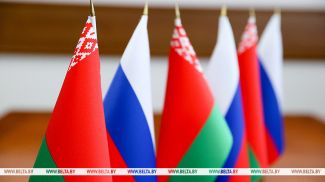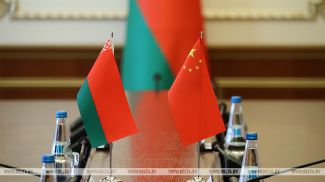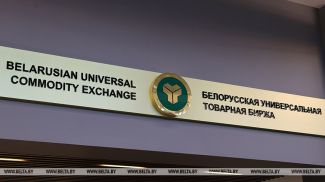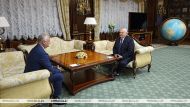MINSK, 16 December (BelTA) – The sanctions the West has enforced against Belarus are subjective and unprincipled. First Deputy Prime Minister of Belarus Nikolai Snopkov made the statement during the government conference hosted by the head of state on 16 December to discuss ways to counteract sanctions against Belarus, BelTA has learned.
Nikolai Snopkov said: “The simultaneous enforcement of more packages of sanctions by the European Union, the UK, the USA, and Canada indicates that key Western players coordinate their approaches and actions against our country. The subjective factor plays a major role as they choose the enterprises to enforce sanctions against. Prominent criteria are absent. There is no principle behind their choices: they choose whoever they please.”
The official noted it is obvious that the sanctions will only grow stronger if they produce no results. It is problematic to predict their targets.
Nikolai Snopkov mentioned the three main channels, through which the introduced sanctions affect the Belarusian economy: finance, merchandise export, and technology import. As far as finance is concerned, key risks are concentrated in the ability to enable transactions of enterprises and raise foreign funding.
Speaking about transactions, Nikolai Snopkov mentioned that in January-October 2021 assets worth up to $10 million were held up in foreign correspondent banks. The sum represents 0.01% of the monthly monetary flow in foreign trade operations. “Over $200,000 has been blocked as of today. Judging by these figures, the situation is far from critical,” the official stated.
Nikolai Snopkov also described how the ability to raise foreign funding had been affected. The total volume of assets kept by non-residents in Belarusian banks amounted to the equivalent of Br17 billion as of 1 December 2021. The figure has grown by Br1 billion this year. Russia's assets increased by Br950 million and China's assets went up by Br200 million while, as expected, assets of countries of the European Union dropped by the equivalent of Br850 million.
A sanction against the Belarusian state debt is an issue, the official said. The sanction was introduced as part of the USA's fifth package of sanctions against Belarus. The sanction represents a direct risk to Belarus' ability to refinance the state debt, including via domestic forex borrowings. Nikolai Snopkov said that Belarus will have to spend $3.3 billion in 2022 and $4.7 billion in 2023 on foreign debts, including debt servicing. The official went on saying that work is now in progress to sign a new stabilization program with the Eurasian Fund for Stabilization and Development. The Russian Federation is expected to grant a state financial loan. Belarus intends to borrow a total $3.5 billion, which will allow compensating for the loss of European funding for refinancing the state debt.
Speaking about the state of affairs with raising investments, Nikolai Snopkov said: “Since a majority of international financial organizations refuse to cooperate with Belarus and other options for raising investments are limited, domestic resources and internal reserves represent practically the only source of development and economic growth.”













